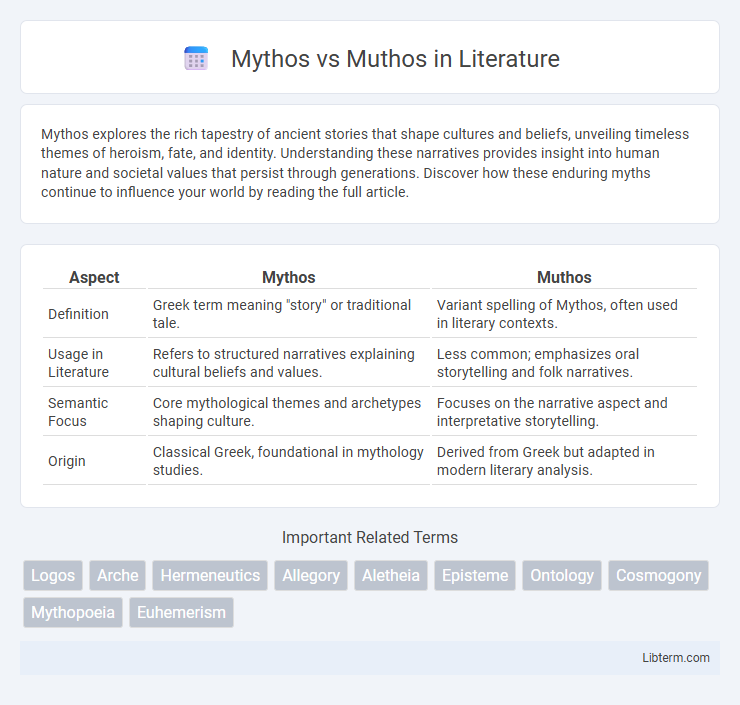Mythos explores the rich tapestry of ancient stories that shape cultures and beliefs, unveiling timeless themes of heroism, fate, and identity. Understanding these narratives provides insight into human nature and societal values that persist through generations. Discover how these enduring myths continue to influence your world by reading the full article.
Table of Comparison
| Aspect | Mythos | Muthos |
|---|---|---|
| Definition | Greek term meaning "story" or traditional tale. | Variant spelling of Mythos, often used in literary contexts. |
| Usage in Literature | Refers to structured narratives explaining cultural beliefs and values. | Less common; emphasizes oral storytelling and folk narratives. |
| Semantic Focus | Core mythological themes and archetypes shaping culture. | Focuses on the narrative aspect and interpretative storytelling. |
| Origin | Classical Greek, foundational in mythology studies. | Derived from Greek but adapted in modern literary analysis. |
Introduction to Mythos and Muthos
Mythos refers to traditional stories or legends that convey cultural values and collective beliefs, often involving gods, heroes, and supernatural events, shaping a society's worldview. Muthos, derived from ancient Greek, emphasizes the narrative aspect of storytelling, focusing on the structure and function of myth in ancient literature and oral traditions. Both terms highlight the importance of myths, but Mythos pertains more to content and cultural significance, while Muthos centers on the form and narrative technique.
Etymology of Mythos and Muthos
The term "Mythos" originates from the ancient Greek word muthos, meaning "story," "speech," or "legend," emphasizing narrative tradition and cultural beliefs. "Muthos," a variant transliteration, reflects the same Greek root but often appears in philosophical or literary contexts to highlight the distinction between myth as fictional storytelling versus logos as reasoned discourse. Understanding their etymology reveals how "mythos" conveys a broader spectrum of storytelling practices foundational to mythological and historical identity.
Ancient Greek Origins
Mythos and Muthos both originate from Ancient Greek, with "Mythos" referring to traditional stories and legends explaining natural phenomena and cultural practices. The term "Muthos" reflects an oral narrative or speech that conveys collective beliefs and values in early Greek society. These concepts highlight the foundational role of storytelling in shaping Ancient Greek identity and worldview.
Mythos in Literature and Philosophy
Mythos, in literature and philosophy, refers to traditional narratives that embody cultural truths and existential meanings shaping human experience. Unlike Muthos, which often implies mere myth or legend, Mythos serves as a foundational framework influencing worldview, moral values, and collective identity across societies. Philosophers such as Aristotle emphasized Mythos as a key structural element in tragic storytelling, highlighting its role in conveying universal themes and ethical lessons.
Muthos: The Spoken Tradition
Muthos represents the ancient spoken tradition of storytelling, deeply rooted in oral culture and communal memory, where narratives were passed down through generations without written records. This form of myth emphasizes the performative and rhetorical aspects of storytelling, preserving cultural values and historical knowledge through voice and gesture. Unlike Mythos, which can imply a fixed literary text, Muthos remains fluid, adapting in each retelling to suit the social and ritual context of its audience.
Mythos vs Muthos: Key Differences
Mythos and Muthos differ primarily in linguistic origin and cultural context, with Mythos originating from ancient Greek meaning "story" or "legend," often used to describe traditional narratives explaining natural or social phenomena. Muthos, while closely related, is more specifically tied to oral tradition and mythological storytelling in certain cultures, emphasizing the performative and ritualistic aspects of myths. Understanding these distinctions is crucial in fields like comparative mythology and literary studies, where Mythos represents structured mythic narratives, and Muthos denotes the underlying cultural and oral expression of those myths.
Role in Shaping Cultural Narratives
Mythos and Muthos both play crucial roles in shaping cultural narratives by framing collective beliefs and societal values through stories. Mythos typically refers to the traditional mythological framework that conveys cultural ideals and cosmologies, while Muthos emphasizes the personal or communal storytelling that reinforces identity and moral lessons. Together, they influence how societies interpret their origins, moral codes, and worldview, solidifying a shared cultural consciousness.
Evolution of Meaning Over Time
Mythos originally referred to traditional stories or legends explaining natural or social phenomena in ancient Greek culture, emphasizing narrative and cultural significance. Over time, the meaning evolved to encompass broader interpretations of myth as symbolic frameworks shaping human understanding and identity in philosophy and literary theory. The distinction between "mythos" and "muthos" highlights linguistic shifts and semantic variations reflecting changing cultural, historical, and intellectual contexts.
Impact on Modern Thought
Mythos, rooted in ancient Greek tradition, represents narrative frameworks that convey cultural values and collective identity, shaping early philosophical and religious thought. Muthos, often interpreted as a modern reexamination or critique of myth, influences contemporary interpretations of storytelling, symbolism, and meaning-making in fields like literature, psychology, and cultural studies. The distinction between Mythos and Muthos underpins ongoing debates about the role of myth in rational discourse, impacting modern thought by challenging the boundaries between myth, history, and science.
Conclusion: Relevance Today
Mythos and Muthos remain crucial frameworks for understanding cultural narratives and human psychology in contemporary society. Their distinction highlights how storytelling shapes beliefs, morals, and identity across diverse cultures, preserving collective memory and tradition. Modern applications in literature, media, and psychotherapy underscore their enduring relevance in interpreting human experience and social values.
Mythos Infographic

 libterm.com
libterm.com